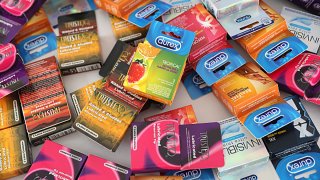
The nurse’s office in schools across Vermont may look a little different this year: The state recently became the first in the country to require all public middle and high schools to distribute condoms.
The program, which was signed into law last year by Gov. Phil Scott (R-VT), was created in an effort to prevent sexually transmitted diseases and unintended pregnancy. Planned Parenthood of Northern New England is providing the condoms. While the law went into effect in July 2021, the Vermont Agency of Education just recently released its guidance on distribution of condoms in all middle and high schools.
WATCH ANYTIME FOR FREE
>Stream NBC10 Boston news for free, 24/7, wherever you are. |
"Condoms should be available in locations that are safe and readily accessible for students, without barriers to obtaining condoms or stigma surrounding access (e.g., should be available through health office or classroom, athletic trainer’s office, guidance office or other locations students can comfortably access)," the guidance states.
While some schools already had condom availability programs in place, the 2021 school year is when schools were required by law to offer the contraceptive.
Get updates on what's happening in Boston to your inbox. Sign up for our >News Headlines newsletter.
Results from a 2019 Vermont Youth Risk Survey, an anonymous survey distributed to middle and high school students, showed 40% of high school students have had sexual intercourse, and approximately half are using condoms.
Mary Beerworth, executive director of the Vermont Right to Life Committee, believes the new policy could actually put more kids at risk for an unexpected pregnancy.
“(Teenagers) don't even always remember to brush their teeth without parents reminding them. A lot of young girls I know who had abortions under age 18, just forgot to take the pill,” Beerworth told TODAY Health. Her biggest concern is that women will find themselves in “a situation where one of their alternatives is abortion.”
U.S. & World
But Lucy Leriche, vice president of Vermont public affairs for Planned Parenthood, said you need to look at the facts.
“Condom availability programs increase condom use, increase condom carrying behavior, promote abstinence or delayed sexual initiation among adolescents, and reduce STD rates,” Leriche wrote in a statement to TODAY Health. “Studies of school condom availability programs find a significant increase in condom use among sexually active students but no increase in sexual activity.”
Leriche also noted that “because students spend a significant amount of time at school and see adults like nurses, guidance counselors and health teachers as reliable resources for information about sexual health, schools can feel like a supportive environment for condom access.”
TODAY reached out to the Vermont Agency of Education and several school districts to discuss their distribution efforts, but did not immediately hear back.
It should come as no surprise that the new law is stirring a debate on social media.
“Thank god my children go to private school. Public schools have no decency, no values, and no principles. Just disgusting,” one Vermont parent wrote on the NBC5 Facebook page.
Added another, "How about teaching students not to have sexual intercourse until they are responsible enough to be self sufficient and a parent. It's called 'abstinence!'"
But Brian Drourr, who has a 12-year-old daughter at Lyman C. Hunt Middle School in Burlington, completely disagrees with those comments.
“The sooner we can get them exposed to safe sex and protection — the better. We need to normalize these things early on,” Drourr said. “I think it’s great and important. Hopefully other states will follow suit.”
According to the Centers for Disease Control and Prevention, as of 2014 just 7.2% of high schools and roughly 2% of middle schools make condoms available to students.
This story first appeared on TODAY.com. More from TODAY:



